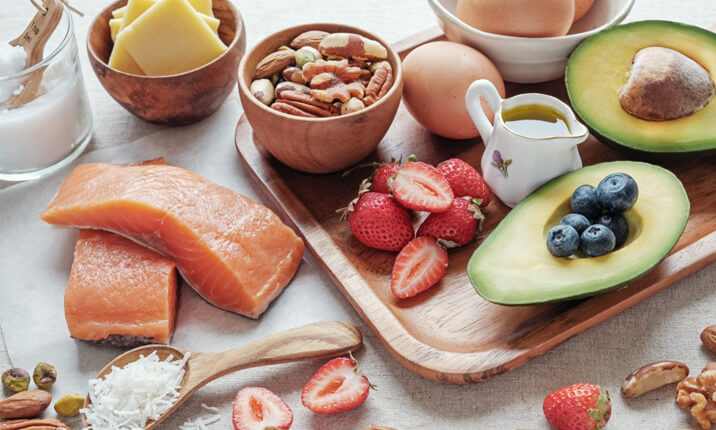-
No products in the cart.
Should you try a Ketogenic Diet?

Ketogenic diet is a diet which aims to force your body to use ketone bodies as a primary source of fuel rather than relying on carbohydrates (i.e. glucose) that can be obtained from sources such as grains, vegetables and fruits. Ketogenic diet has been suggested to help in weight management as stored fats are needed to be broken down by the liver to produce ketones.
In order to achieve ketosis (i.e. body starts to use ketone bodies as a source of energy):1
- Individuals would need to be deprived of carbohydrates (i.e. between 20g to 50g of carbohydrates per day)
- Mindful of protein intake as it can interfere with ketosis
What do you eat in a Ketogenic Diet?
Ketogenic diet has a high fat requirement, where individuals would have to consume fat at every meals (e.g. in a daily 2,000 kcal diet, he/she would be consuming around 165g of fats, 75g of protein and 40g of carbohydrates).1
While fats and protein are part of the Ketogenic diet, the diet generally does not discriminate between the types of fat nor the protein type. However, there is more emphasis on the quantity of carbohydrates consumed, where only low-carbohydrate fruits and vegetables are allowed. For example, small amounts of berries, green leafy vegetables and fibrous vegetables (e.g. kale, broccoli, brussels sprouts, asparagus, bell peppers, cucumbers, cauliflower, etc).
Is Ketogenic Diet beneficial?
Weight loss is one of the key reasons why individuals use the Ketogenic diet. Even though there is some evidence which suggest that individuals following Ketogenic diet/very low carbohydrate diet may have a faster rate of weight loss, but the weight loss is often unsustainable.2 This is because Ketogenic diet is very restrictive, requires a lot of meal planning and preparation and can be really challenging to follow over the long run.
Individuals who are following the Ketogenic diet may feel very lethargic at the beginning and would have issues such as bad breath, nausea, vomiting, constipation and sleep problems. In addition, because the diet is high in fats and can be limited in food options, individuals who are following the Ketogenic diet are at higher risk of nutrient deficiency, liver problems, constipation, kidney problems and heart diseases.3
Key takeaways
Ketogenic diet may be able to provide short term weight loss, but it is likely to be unsustainable for most people, and it can be notoriously unhealthy as it is typically high in fats and deprived of carbohydrates (i.e. essential for normal healthy body functions) and micronutrients.
Hence, here are some tips which you can follow if you are currently on a Ketogenic diet or planning to embark on the Ketogenic diet.
- It’s not about going on low carbohydrates, it’s about choosing the right type of carbohydrates. It is evident that carbohydrates are essential for good health and unrefined (or complex) carbohydrates are beneficial for weight management and health. Don’t limit your unrefined carbohydrates options to wholemeal bread, oats and brown rice, consider other nutrient-rich options such as : muesli porridge, quinoa, millet, etc. It is also wise to opt for low-carb vegetables to eat while on a ketogenic diet to obtain sufficient micronutrients for your body.
- Not all proteins are equal. Consider lean protein (e.g. skinless chicken breast or turkey), oily fishes (e.g. salmon, tuna, etc) and plant-based protein (e.g. soybean, bean products, plant protein powder, etc). Limit the intake of red and processed meats (like hot dogs, ham, sausages, corned beef,etc.) as studies have suggested that these could raise your risk of cardiovascular diseases.
Seafood (think salmon, oysters, mackerel, etc) is a smart choice for keto-friendly foods – low in carbohydrates and high in healthy fats (esp. Omega 3) & lean protein.
Choose lots of whole plant-based foods that are rich in healthy fats, such as avocados, chia seed oil, chia seeds, sacha inchi seeds, unsalted baked nuts, etc. These plant foods are usually packed with micronutrients as well.
References
- Havard Health Publishing. (2020). Should you try the keto diet? https:// www.health.harvard.edu/staying-healthy/should-you-try-the-keto-diet [Accessed 13 July 2021].
- Ting, R., Dugré, N., Allan, G. M., & Lindblad, A. J. (2018). Ketogenic diet for weight loss.
- Mayo Clinic. (2021). The truth behind the most popular diet trends of the moment.
- Havard Health Publishing. (2020). Ketogenic diet: Is the ultimate low-carb diet good for you?

